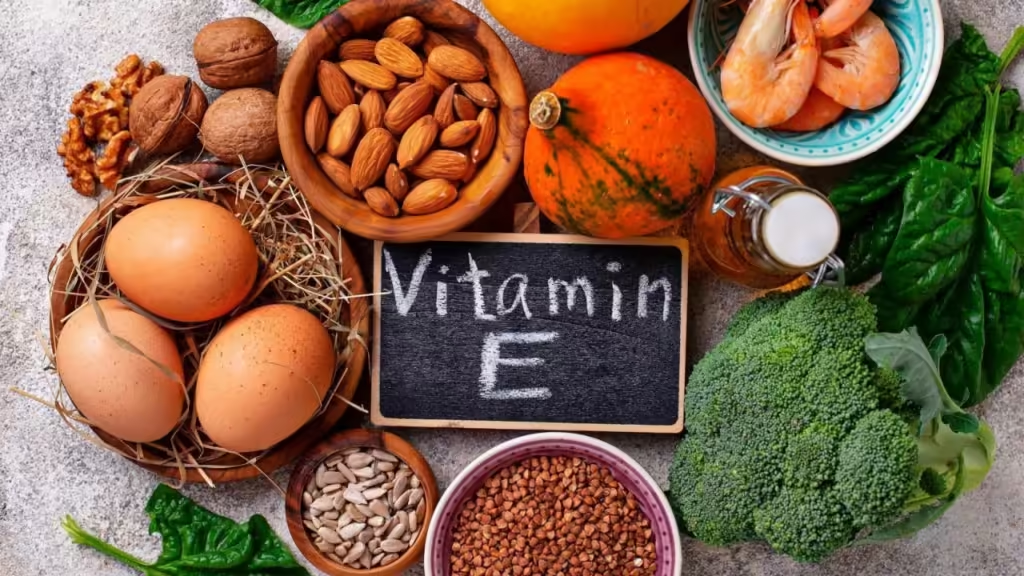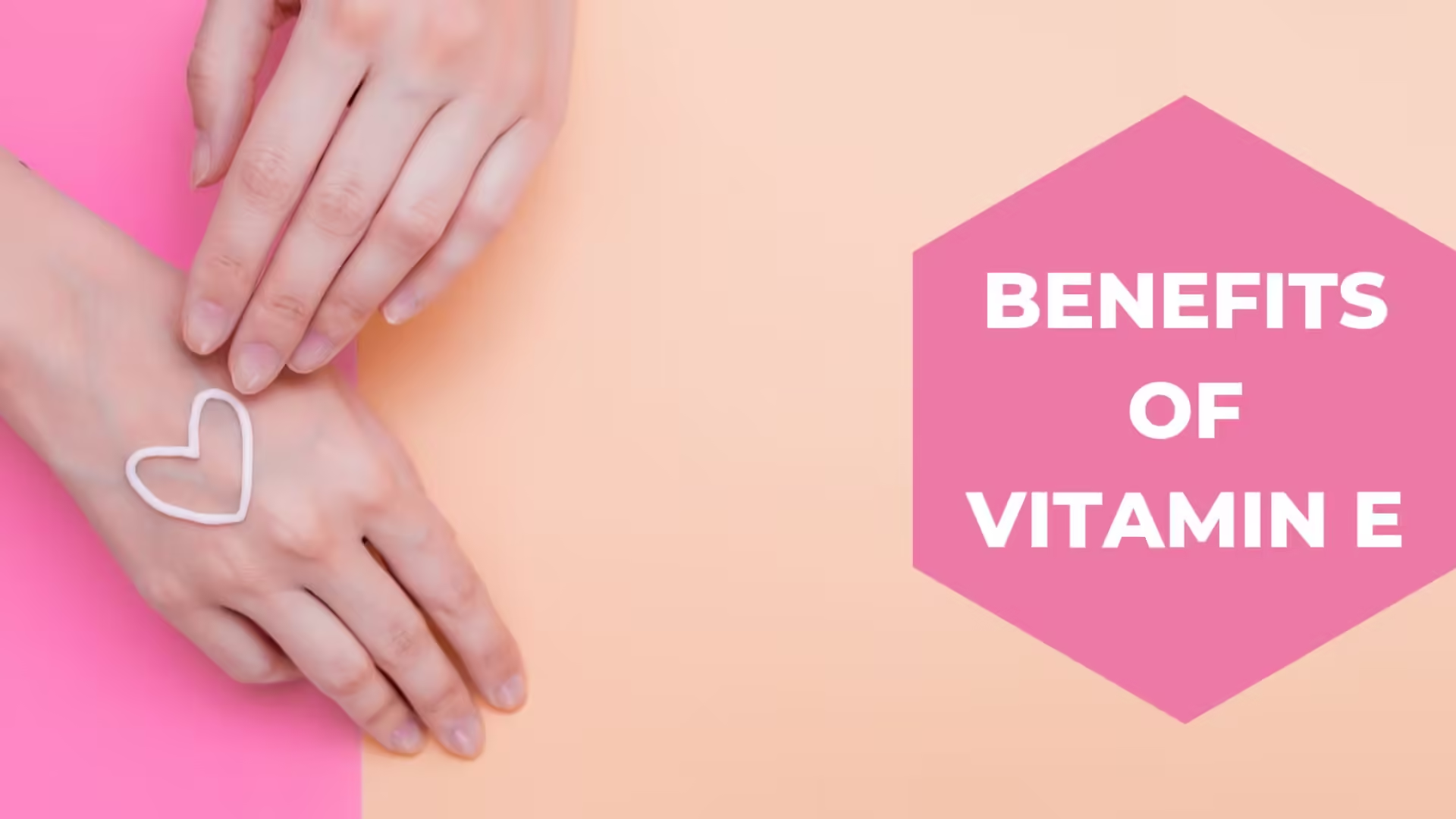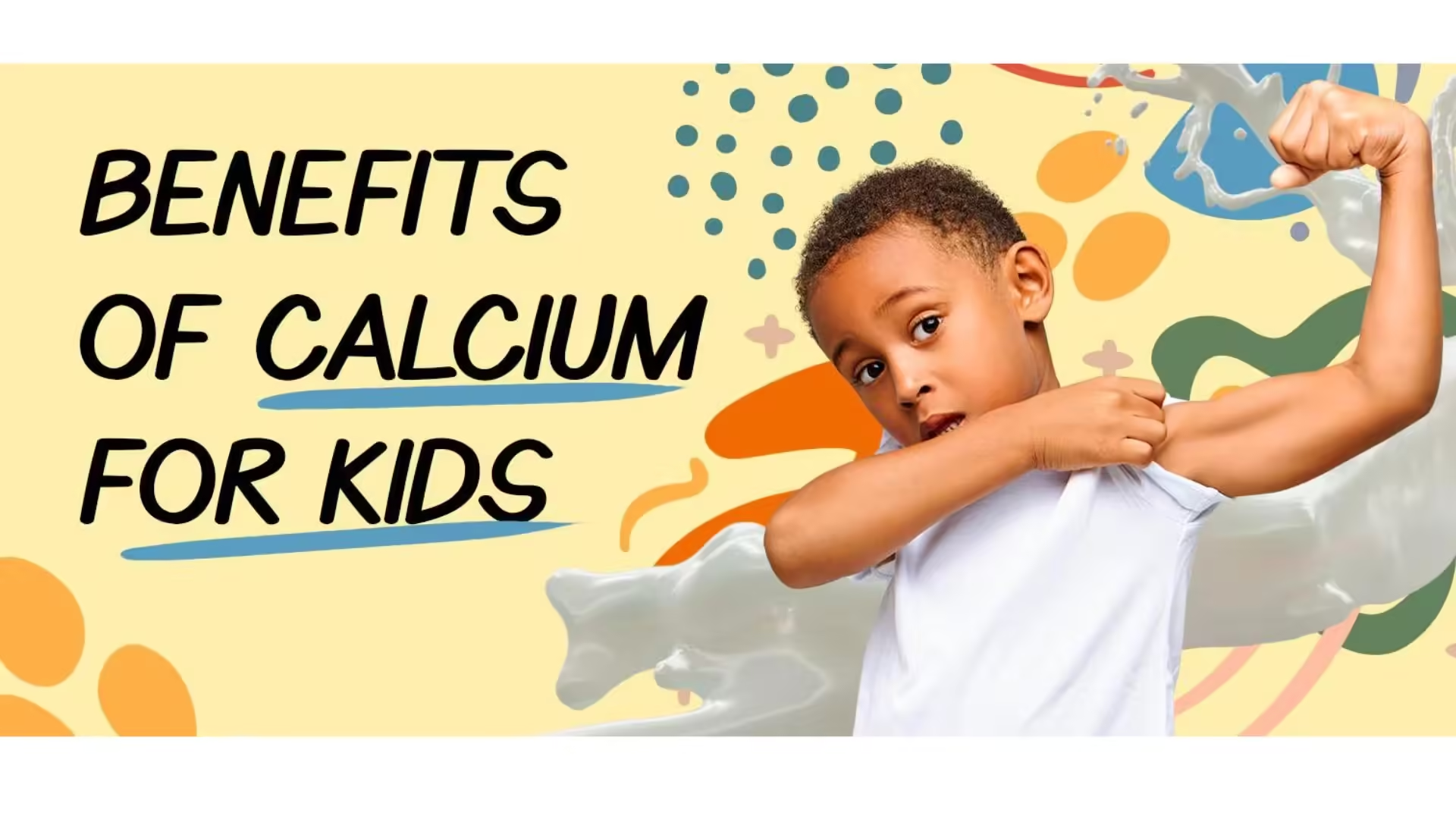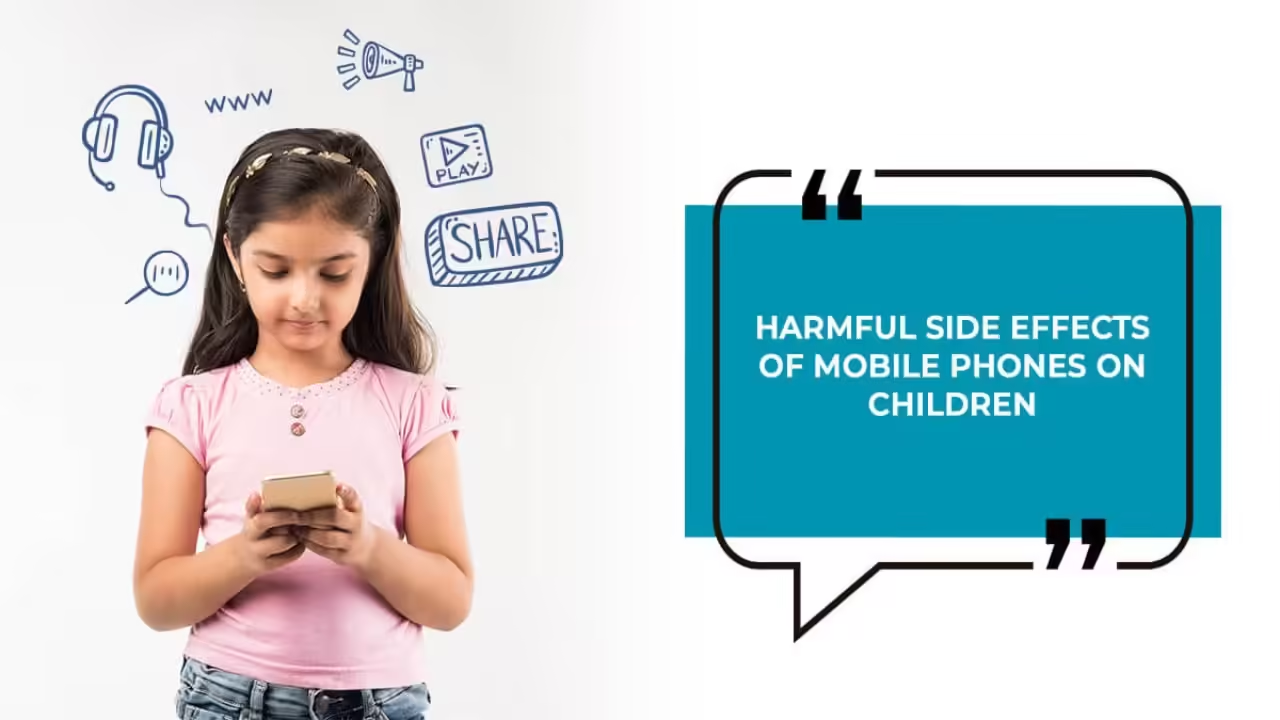Hello, Beautiful People! Do you also want your child to be healthy and active? I’m here with the solution! You need to add Vitamin E to their diets.
I recently had problems with my younger child; his immune system was not strong with weak muscles and a dull personality. I’ll share my experience with solutions so, remain connected till the end of the blogpost.
In this comprehensive guide, I’ll discuss the remarkable benefits of Vitamin E with you. After reading this completely all your issues regarding deficiencies of Vitamin E will get resolved. Also you’ll clear regarding the supplements for your children and the sources of Vitamin E.
Let’s start this post by taking step towards healthy lifestyle:
What is Vitamin E

Vitamin E is a vitamin that fuses in fat. It acts as a powerful antioxidant in the body. Antioxidants help protect cells from damage caused by free radicals (unstable molecules that can harm cells and contribute to various health issues).
Vitamin E is Essential For:
- Maintaining healthy skin and eyes.
- Protects immune system
- Plays a role in supporting cell function
- Protects against inflammation.
Benefits of Vitamin E for Kids
Vitamin E offers a range of benefits like it boosts up your energy. It also supports your muscle and Immune system. It acts as an antioxidant and gives you healthy skin. Remember, a healthy diet is necessary for your children.
Some delicious options are:
- Almonds
- Peanuts
- Sunflower seeds
- Spinach
- Kale
- Red Bell Pepper
- Sunflower oil
- Olive oil
Benefits of Vitamin E
- Supports Immune System: Vitamin E sustains your kid’s immunity. It helps children repel infections. In this way, your children will stay wholesome.
- Promotes Skin Health: Vitamin E advocates healthy skin. It protects the skin from damage caused either by solar radiation or environmental factors. It keeps your skin moisturized and glowing.
- Antioxidant Protection: Vitamin E helps in balancing harmful free radicals in the body. They contribute to universal strength and well-being.
- Brain Development: Vitamin E play a role in brain development and cognitive function in children. This is why Vitamin E should be given to children necessarily.
- Heart’s Health: Vitamin E supports cardiovascular health. It helps in maintaining healthy blood vessels and circulation.
- Muscle Function: Vitamin E is important for proper muscle function. It helps children maintain strength and endurance.
- Eye Health: Vitamin E is beneficial for eye health. It helps protect against age-related vision issues.
The following video is about Vitamin E:
https://youtu.be/QsgfFdztKu0?si=M8mWyDyqWLewi-sx
Finding Vitamin E for Your Little Superhero
Add Vitamin E to your child’s nutrition to make them healthy and dynamic. The good thing is you can locate this in your kitchen. Vitamin E isn’t only for grown men but for your off-springs too.
Plate with Nuts: Almonds, peanuts, and sunflower seeds are full of Vitamin E. If your kids like yogurt, you can splash them on yogurt.
Avocado: The Avocado is a great source of Vitamin E. You can slit it’s portions on sandwiches. You can also fuse it into smoothies. This will make up a power-up breakfast.
The Vegetables: Leafy greens are rich in vitamins and minerals. You can use them with omelets. You can also fuse them into green smoothies. This will be a superpower boost.
Red Bell Pepper Power: This has a surprising dose of Vitamin E. It adds a sweet munch to salads and stir-fries.
Sunflower Oil Sunshine: This versatile oil is a great source of Vitamin E. It is perfect for:
- Salad dressings
- Stir-frying
- Baking.
Olive Oil: Olive oil is high in Vitamin E and offers health benefits.
Remember:
- Provide your children with variety of different foods to make eating fun and healthy.
- Also, make different food shapes and involve your child in the preparation of meals.
Vitamin E Supplements for Children
Vitamin E supplements are beneficial for children. Mainly for those who may not get enough of this nutrient from their diet. Here are some key points about Vitamin E supplements for children:
Dosage of Vitamin E
The recommended dosage of Vitamin E varies by age:
- Infants (0-6 months): 4 mg (6 IU)
- Infants (7-12 months): 5 mg (7.5 IU)
- Children (1-3 years): 6 mg (9 IU)
- Children (4-8 years): 7 mg (10.4 IU)
- Children (9-13 years): 11 mg (16.4 IU)
- Adolescents (14-18 years): 15 mg (22.4 IU)
Forms of Vitamin E
Vitamin E supplements are available in different forms. They include:
- Capsules
- Softgels
- Chewable tablets.
Choose the above forms according to the age and preferences of your child.
Benefits of Vitamin E
Vitamin E is an antioxidant that helps
- Protect cells from damage
- Supports immune function
- Skin health
- Well-being.
Side Effects
While Vitamin E is generally safe, excessive intake can lead to side effects such as:
- Nausea
- Diarrhea
- Risk of bleeding.
Give your child the recommended dosage. And consult with a healthcare professional before giving supplements to children.
Food Sources
Encourage a balanced diet rich in Vitamin E-containing foods like:
- Nuts
- Seeds
- Vegetable oils
- Leafy greens
- Fortified products.
Consult Your Doctor
Talk to your child’s pediatrician before you start any supplement. He’ll assess your child’s nutritional needs. After that he’ll provide guidance accordingly.
Remember, if you provide your child with supplements, always furnish them with a healthy diet. Also be certain that supplements can’t replace a healthy diet. Focus on providing foods that have high nutrient content to your child. It’ll support your child’s growth and enlargement.
Vitamin E is an antioxidant vitamin that plays a role in heart health. Here are some of the best plant-based sources. #nutrition#healthyeating pic.twitter.com/3ALUf1luoF
— Kristie Leong M.D. (@DrKristieLeong) July 26, 2024
Sources of Vitamin E
The sources of Vitamin E are as follow:
Food Category |
Examples |
Vitamin E Content |
|
|
Rich in Vitamin E |
|
|
Good sources of Vitamin E |
|
|
Contain Vitamin E |
|
|
Enriched with Vitamin E |
|
|
Natural source of Vitamin E |
|
|
Provide Vitamin E |
|
|
Contain Vitamin E (smaller amounts) |
Remember:
- Eating a mix of foods is the best way to get Vitamin E.
- Try different foods and keep your meals interesting and healthy.
- Talk to your doctor about getting enough Vitamin E.
Conclusion
In conclusion, Vitamin E is a superhero for your child’s health. It will help:
- The immune system is strong
- It will keep their skin healthy
- Make their muscles strong
- Protects from free radicals.
Add Vitamin E to daily meals for your children. It’ll help them grow well and stay strong. Vitamin E is like giving them a shield against sickness.
Include Vitamin E in your child’s diet and see them shine like a superhero. Fill your child’s plate with Vitamin E-rich foods. Remember, a balanced diet is a real power booster. With Vitamin E on your child’s side, your children will grow well and stay strong.
FAQ
Q: Give me signs of Vitamin E deficiency.
A: Vitamin E deficiency isn’t developed in your child who takes a balanced diet. Some symptoms can include:
- Muscle weakness
- Vision problems
- Weakened immune system.
Q: How can I ensure that my child get enough Vitamin E?
A: Many delicious foods are naturally rich in Vitamin E:
- Nuts
- Seeds
- Avocados
- Vegetable oils
- Leafy greens
- Some fortified cereals
- Kids friendly snacks
Q: What are risks of Vitamin E?
A: Vitamin E from food is generally safe. However, very high doses of supplements can cause side effects like:
- Nausea
- Stomach cramps
- Increased bleeding risk.
Q: At what age, should I start supplements for my kids?
A: Vitamin E supplements are recommended for your kids with specific health conditions. You can contact your healthcare provider, he’ll guide you the best way.
Q: What is recommended does my child need daily of Vitmain E?
A: The recommended daily does of Vitamin E for children varies by age:
Age Group |
Recommended Daily Usage |
IU (International Units) |
|
Infants (0-6 months) |
4 mg |
6 IU |
|
Infants (7-12 months) |
5 mg |
7.5 IU |
|
Children (1-3 years) |
6 mg |
9 IU |
|
Children (4-8 years) |
7 mg |
10.4 IU |
|
Children (9-13 years) |
11 mg |
16.4 IU |
|
Adolescents (14-18 years) |
15 mg |
22.4 IU |



